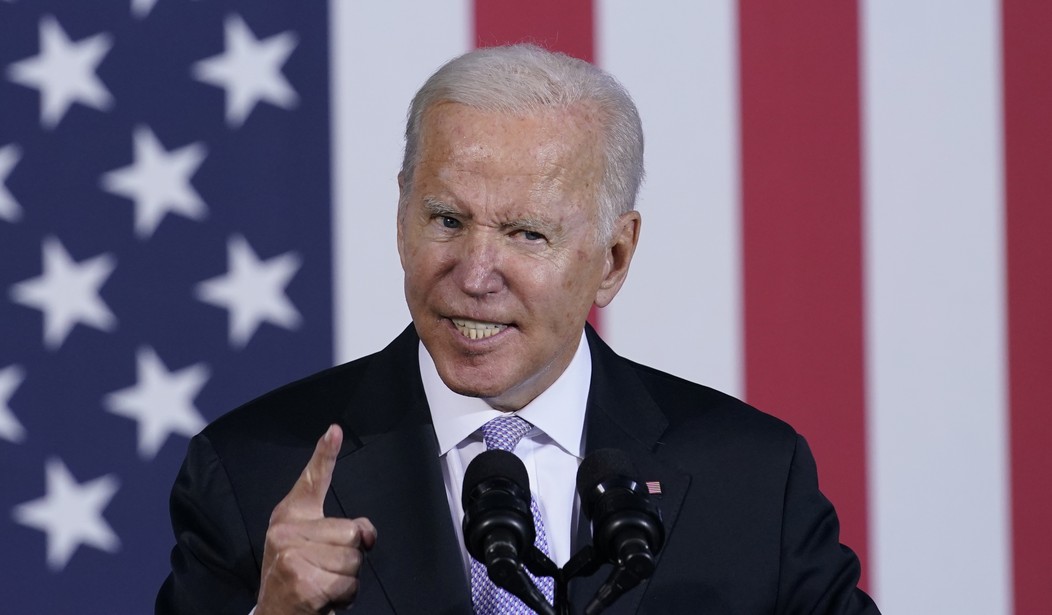According to the latest installment of the Axios/Ipsos Coronavirus Index, President Joe Biden is losing support when it comes to those who think his administration can "ensure the economy recovers quickly after the COVID-19 pandemic."
Confidence in President Biden's ability to rescue the economy from COVID-19 has dropped since January, even as Americans' faith rises in his ability to make the vaccine widely accessible, according to the latest Axios/Ipsos Coronavirus Index. https://t.co/wJogeqUikl
— Axios (@axios) October 26, 2021
While 52 percent were confident in January, that number is now at 44 percent. What is particularly relevant is where the drop is coming from.
In her Tuesday write-up for Axios, Margaret Talev warns that the confidence in Biden's Covid recovery is tumbling. She goes on to note that "It's Democrats and independents driving the declining economic confidence, from 52% of all U.S. adults at the start of his presidency to 44% now. Their softening faith could hinder Biden's ability to lead and hurt Democrats' position heading into the 2022 midterms."
Further down, she writes:
By the numbers: 71% of Democrats said they're confident that the Biden administration can ensure the economy recovers quickly after the COVID-19 pandemic — but that's down from 86% in late January just after Biden's inauguration.
- Independents' confidence on that measure has dropped to 42% from 51%.
- Republican support is now at 18%, virtually unchanged from 17% in January.
And, a write-up from Ipsos notes:
Slightly less than half (44%) are confident it can ensure the economy recovers quickly after the COVID-19 pandemic. This represents an eight-percentage point decrease since late January 2021, shortly after Biden’s inauguration. The steepest declines have come from:
- Black Americans (-23 percentage points)
- Democrats (-15 percentage points) and Independents (-9 percentage points)
- Americans under age 50: those 18-29 (-12 percentage points) and 30-49 (-13 percentage points)
Recommended
Even worse for the president is that despite all of the effort from his administration to get people vaccinated, very few are actually confident it will amount to anything. Just 21 percent are confident the administration can "convince vaccine skeptics to get the vaccine," with 5 percent being "very confident."
The poll does acknowledge that the Biden administration has support from respondents on its ability to make the vaccine widely available and distribute it quickly. But, the messaging is all wrong, including and especially when it comes to blaming the unvaccinated:
What they're saying: Biden's messaging is "focused on the wrong problem" from a confidence-building perspective, said Cliff Young, president of Ipsos U.S. Public Affairs.
- "The problem is not the unvaccinated. The problem is convincing those who are vaccinated that they have the tools to navigate a COVID world ... [and reassuring] those who’ve been vaccinated that they can live a normal life again."
- "People are confused," Young said. "There's no sense of what the endgame is."
...
Their confusion could deepen their unease, said Ipsos pollster and senior vice president Chris Jackson.
- "There's this huge mushiness about who's protected, how much they're protected," he said.
- "Democrats have always been more worried about the pandemic" than Republicans. As a result, he said, "they still don't necessarily think they're safe."
Americans are also thoroughly confused about how the virus affects the unvaccinated versus vaccinated. "Six in 10 Americans either incorrectly believe that unvaccinated people and vaccinated people are equally likely to test positive for the virus, or said they don't know," Talev highlighted.
The Ipsos release also points out that Americans have lost trust in the president to give them accurate information, comparing percentages from January 22-25 to September 24-27.
In January, 58 percent trusted Biden "a great deal" or "a fair amount" to give them accurate information about the virus. That number went down last month to 45 percent. The high mark had been 92 percent among Democrats, 21 percent among Republicans, and 59 percent among Independents. It's since dropped to 81 percent among Democrats, 11 percent among Republicans, and 42 percent among Independents.
The Axios/Ipsos Poll was conducted October 22-25 with 1,038 adults and a margin of error of plus or minus 3.3 percentage points.
Talev highlighted concerns for the 2022 midterms in her write-up.
CNN's Chris Cillizza, in his recent analysis of the overall worsening of polls for the president, also addressed the midterms:
The real danger in Biden's current approval rating doldrums is for his party's candidates in the coming midterm election. If a president's approval rating is under 50%, his party loses an average of 37 seats in the House. Average!
In 2018, Trump's approval rating in the final Gallup poll before the election was mired in the low 40s and Republicans lost 40 House seats (and the majority). In 2010, Obama's approval rating had dipped to 45% and Democrats lost 63 seats (and the majority). In 1994, Clinton's approval rating was 46% and Democrats lost 53 seats (and the majority).
You get the idea. The evidence is pretty conclusive -- and none of it points to good news for Democrats in 2022.
It's worth noting that Cillizza's piece was updated on Monday, just before the Axios/Ipsos' poll release. His moment of hope may be even more tarnished then:
Now, it's of course worth noting that it's late October 2021, not late October 2022. And that if Biden and congressional Democrats can find a way to a compromise on both the "hard" infrastructure plan and the social safety net legislation, that Democrats could well have an appealing package of accomplishments to sell to voters come next November. There's also the reality that the trend lines on Covid-19 cases are headed downward, and, if that keeps up, Biden could well benefit some from an overall improved outlook among the populace.
Get ready for a Red Wave 2022 as buyer's remorse looks to become even more pronounced.

























Join the conversation as a VIP Member